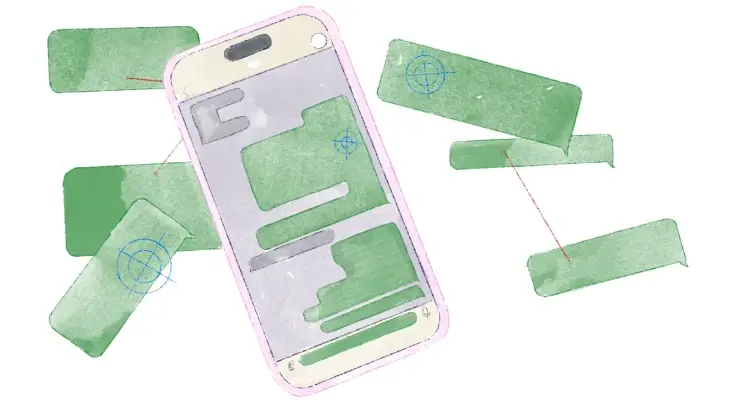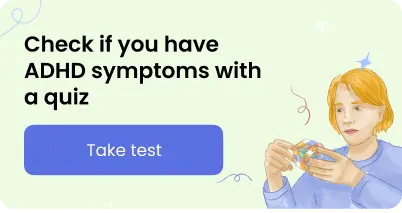TL;DR
- Hyperfixation is a strong and absorbing interest in something that can make you put all other aspects of your life into a pause.
- While hyperfixation is common among neurodiverse people (particularly those living with ADHD and ASD), some neurotypical people can experience it as well.
- “Is hyperfixation normal?” Yes, if it doesn’t interfere with your daily life and lets you explore your passions without overshadowing your responsibilities.
- ADHD hyperfixation usually stems from differences in brain functioning, emotional dysregulation, dopamine deficit, lack of impulse control, and anxiety.
- To cope with hyperfixation, you may need to set time limits, schedule breaks, and find alternative distractions.
What is hyperfixation? 🤔
You find yourself so concentrated on something like never before. Time flies by, and you can spend hours and days in this flow state.
Neurodivergent hyperfixation is a two-sided coin that may bring both advantages and drawbacks to people’s lives. When fully absorbed in something enjoyable, many of us don’t keep track of time and do our best to achieve excellence while having fun.
Do you remember the last time you read a gripping book or watched an intriguing movie? We suppose that you were fully engaged and eager to see what happens next. You may want to keep reading or watching without interruption, wholly immersed in the story.
However, what would you do if there were an urgent work task or a call from your loved ones?
For those experiencing hyperfixation, there may not be anything that would break in.
Most often, people with neurodiversity experience such full absorption in an engaging activity. Hyperfixation is common not only for those living with ADHD. People with autism spectrum disorders (ASD) and anxiety disorders can get hyperfixated as well.
Hyperfixation symptoms
How to differentiate hyperfixation from a deep interest? Sometimes, it may be a complicated task. See below for several hyperfixation manifestations:
- Interests can develop and disappear incredibly quickly. Painting, cooking, cycling, gardening… Everything turns from impressively engaging to incredibly boring in days or weeks. Can you hyperfixate on a person? Yes! But this feeling also goes away quite rapidly.
- People can experience a guilt complex when giving up another hobby. They may wonder, “What was I thinking about while spending so much time and effort on that?” Feeling unfulfilled, they grab another hobby almost instantly.
- Getting back to reality from the hyperfixation episode might feel like emerging from a dream. Have you ever felt like you were in a trance, losing connection with reality while doing something engaging? That’s it!
- After a specific subject gets uninteresting, it takes time and effort to jolt back into real life. Hyperfixation leaves a person disoriented and makes it challenging to manage routine tasks for some time.
Difference between hyperfixation and other states
Rychel Johnson, M.S., LCPC, comments, “Hyperfixations can vary widely from person to person. While hyperfixation can be a positive experience, providing a sense of purpose and enjoyment, it can also interfere with daily functioning if it leads to neglect of important obligations.”
Is hyperfixation normal? Yes, if it doesn’t influence your life negatively. Even some people without mental health conditions might experience it from time to time.
Moreover, a deep interest in something doesn’t always mean it’s a hyperfixation. There are also other terms that people may find confusing.
Check out the difference between hyperfixation and special interest, obsession, and hyperfocus to gain a better understanding of what happens to you.
👀 Hyperfixation vs. special interest
Special interest always involves extreme engagement in a particular topic. You may be interested in cars, football, cooking, or singing. Most people have special interests, which often turn into their hobbies and occupations.
Usually, people don’t get lost in their interests and pay attention to them in their free time. They can perform daily tasks, spend time with loved ones, and maintain a balanced lifestyle.
Hyperfixation is more temporary and absorbing. Let’s answer the question, “How long does a hyperfixation last?” Most often, days or weeks.
It is a time when people tend to ignore everything that is out of their focus. They lose track of time, “turn the world off,” and may forget to eat, sleep, or communicate with other people. But then the hyperfixation finishes, and reality might hit hard.
👀 Hyperfixation vs. obsession
“There comes a time in your life when you have to choose to turn the page, write another book or simply close it.” — Shannon L. Alder, an inspirational author and therapist.
Obsession is one of the main OCD symptoms. However, people without OCD may experience it as well.
The main difference between obsession and hyperfixation is that the obsession comes from intense fear and anxiety. Repetitive and intrusive thoughts lead to numerous “what ifs” and make people feel stressed, constantly thinking about the theme of obsession.
Compulsions are another aspect that often comes with obsessions. These are mental or physical actions that people do to avoid uncertainty.
Cleaning the house 3 times daily, clapping hands before leaving home, or thinking about a red monkey before an important performance. It can be anything!
As you see, hyperfixation is different. It usually involves focusing on a pleasant activity that brings enjoyment. Additionally, when people are hyperfixated, they don’t experience compulsions.
👀 Hyperfocus vs. hyperfixation
Let’s turn back to a work report you needed to do several sections before. When experiencing hyperfocus, you wouldn’t answer the phone call, make coffee, or scroll TikTok. You might not even leave the room to have lunch.
Hyperfocus is a deep concentration on a specific task. It shouldn’t necessarily be enjoyable. The need to do something to reach the goal drives people to stay hyperfocused.
This is that desired flow state that many people try to reach when they’re working or doing creative things.
Hyperfixation doesn’t require willpower at all. People do something they take pleasure from. It doesn’t involve any goal except pure enjoyment from the process.
Moreover, hyperfixation isn’t time-limited. As you don’t have a goal, you will engage in something as long as you’re interested.

Is hyperfixation a symptom of ADHD?
Exploring hyperfixation’s meaning sheds light on why it occurs. While officially, it isn’t a symptom in the ADHD iceberg, it’s more common for people living with neurodiversity than for those who are neurotypical.
It may sound confusing. How can hyperfixation and ADHD coexist if ADHD is literally an attention-deficit disorder? This is a great question that has an unexpectedly logical answer!
ADHD is often more about attention abundance than about attention deficit. It literally means that people experiencing this cognitive difference struggle to control and regulate their focus.
Consequently, switching between tasks may be as challenging (or even more challenging) than being totally absorbed into one activity.
As a result, people with a wealth of attention can have difficulties shifting focus and tend to hyperfixate. OCD hyperfixation and autism hyperfixation are also quite common.
If you experience something similar to hyperfixation and have encountered a question like, “Am I neurodivergent?” Breeze has something for you. Take an ADHD test to get insights into your mental well-being and uncover personalized recommendations.
ADHD hyperfixation examples
What might a neurodivergent person focus on so intensely? Actually, there are many variants.
Hyperfixation on food 🍕
— What will you eat for dinner?
— Probably, sandwiches.
— But you ate sandwiches for lunch today. And you’ve been eating sandwiches every night for a week already. Is everything fine?
— Yeah, they’re just… tasty!
Actually, this is what hyperfixation on food might look like.
“But why do I hyperfixate on a certain meal?” you may ask. Here are a few reasons.
- Decision paralysis. When there are so many options to choose from (and to eat), for people with attention deficit, it might be easier not to choose anything. This is what ADHD paralysis means. So, not to get stuck in what-ifs, people might opt for “comfort food” and eat it for several days in a row.
- Executive dysfunction. Doing grocery shopping, looking for recipes, and cooking dinner… It all sounds almost impossible! So, someone with a hyperfixation on a certain meal can keep eating it again and again. Especially as comfort food is often simple (like peanuts or bananas) or easy to order (like pizza).
Hyperfixation on a person 🫂
Yes, it’s normal to fall in love with someone or be a big fan of someone. Still, sometimes what starts as a deep interest turns into a hyperfixation on a crush.
Think about K-pop fans who obsessively follow their idols, memorizing every detail about their lives and spending hours online watching their performances. They can even change their appearance to look like a favorite idol.
No one can draw a clear line between being a fan and have overly extreme interest. Besides, if you find yourself thinking, “I do not control the hyperfixation,” it may be an alarming sign.
Hyperfixation on a hobby 🎮
Let’s talk about Mabel Pines from Gravity Falls. She has a hyperfixation with crafting and creating art projects. Whether Mabel knits a sweater, makes friendship bracelets, or works on an elaborate art piece, her enthusiasm for crafting shines through.
Sometimes, this kind of hyperfixation can bring some benefits to your life and help you gain new skills. But if you start and drop something really quickly without noticing the progress, it might cause frustration.
Hyperfixation on a place 🗺️
“What secret is hidden behind the Bermuda Triangle?”
Neurodivergent hyperfixation on a place can be pretty different. You may want to:
- Visit a certain place in your city again and again
- Move to another country and constantly read about its history, culture, and local customs
- Collect travel guides, maps, and souvenirs related to your favorite destination
- Research and watch YouTube videos about the secrets of a certain place, etc.
In fact, hyperfixation meaning can be different for everyone, reflecting personal interests, experiences, and emotional connections.
Hyperfixation on your thoughts 💭
“What if I fail this exam? What can I do to prepare better? What else should I read to pass and get a good mark? This determines my destiny at the university!”
Intrusive thoughts can feel like chewing gum that you can’t throw away. In some cases, hyperfixation of thoughts can feel like an obsession — fear and anxiety may follow it and cloud your judgment, making it hard to focus on anything else.
Besides, you might also find yourself hyperfixated on positive thoughts or dreams, which is definitely more pleasant.
Other forms of hyperfixation 🤖
Have you seen Netflix’s Stranger Things series? If yes, you remember Dustin’s obsession with Dart, a mysterious creature he encounters in the woods. Despite warnings from his friends and family, Dustin becomes hyperfixated on it, spending hours researching and investigating its existence.
As you see, objects people focus on can be pretty different. From delving deep into a video game or a movie to ADHD hyperfixation on a crush that makes you explore everything about a person’s life, the spectrum is vast.
But why do we hyperfixate? Keep reading to explore possible reasons that make us dwell on something or someone.

What causes ADHD hyperfixation — 6 reasons
There’s nothing wrong with being focused on something, whether it’s a hobby, food, or a video game. Spending hours on the things you like doesn’t make you lazy or careless.
ADHD hyperfixation turns out to be problematic if it affects your daily functioning. So, if you feel that a new TV series is becoming all-consuming and you can watch three seasons in two days, it’s time to get alarmed.
“Why do I hyperfixate on things?” While there’s no 100% clarity on how the mechanism of extreme focus starts, we need to keep in mind the main causes of hyperfixation.
1️⃣ Differences in brain functioning
People with ADHD tend to hate monotonous tasks like cleaning, laundry, or ironing. Waiting in line often feels like a nightmare for them.
At the same time, engaging tasks feel more enjoyable for them than for neurotypical people. This is because the brains of people with ADHD require less cognitive effort to focus on activities that provide a high stimulation level.
New, variable, and rewarding tasks stimulate their brain functioning and provide a sense of accomplishment. Thus, people want to engage in them more and more… and more. This is why hyperfixation and ADHD are quite common together.
2️⃣ Emotional dysregulation
How are autism and ADHD connected? Both these mental health conditions bring challenges with emotional dysregulation to people’s lives.
A broken cup, an unexpected traffic jam, or even a phone call you don’t want to answer — everything can bring discomfort to people’s lives. For people living with ADHD or autism, these stressors are usually even more triggering.
As a result, regulating emotions and thoughts can turn into a significant challenge. To process emotional information and escape unpleasant feelings, people experiencing ADHD may overly focus on something else.
So, what is ADHD hyperfixation in this case? It’s a mechanism that helps some of us deal with reality. People may unconsciously escape daily challenges by getting absorbed in knitting, reading, learning a new language, or anything else.
3️⃣ Dopamine deficit
In many cases, people living with ADHD may face dopamine deficiency or difficulties with processing dopamine in the brain. As a result, it takes immeasurable effort for them to “turn off” negative thoughts, change habitual behavior, and shift between different tasks.
Hyperfixation and ADHD go together as people living with this cognitive difference tend to overly focus on stimulating activities to get enough dopamine. It’s much more challenging for them to get to a “boring” task, as it makes them frustrated, angry, and impulsive.
4️⃣ Lack of impulse control
You’re doing a vital work report when suddenly your phone rings. You answer the call and then feel an urge to make a cup of coffee. The coffee is ready, and it’s time to scroll TikTok while drinking it. Then, sending memes to your friend turns into 30 minutes of chatting.
What? Work report? Do you still need to do it?
Sounds relatable, right? Hyperactive and impulsive behavior is quite typical for people living with ADHD. However, this impulsivity can make them hyperfixate as well.
When surrounded by engaging activities, people with ADHD can fall into an intense focus. At the same time, all other vital but uninteresting tasks “stop existing” for them. Their interest gets too extreme, and they fall into a period of ADHD hyperfixation.
5️⃣ Anxiety and stressful environment
Can you imagine that 50% of adults with ADHD report severe to extremely severe symptoms of anxiety? Quite often, hyperfixation can become a coping mechanism that helps people living with various cognitive differences like ADHD, autism, or anxiety disorders overcome life challenges.
Let’s remember Luke from the Netflix film “To the Bone.” He lives with anorexia and body dysmorphia while having a hyperfixation on food and training. This extreme focus helps him distract from severe life issues and provides a feeling of “control” over his life.
If you’re looking for ways how to calm your anxiety and take care of your mental health, it may be helpful to take Breeze’s assessment. It will provide insights into what might hold your well-being back and how to improve it.
6️⃣ Physiological factors
Let’s face it, lifestyle also influences our typical behavior. It doesn’t matter whether you live with ADHD, autism, or an anxiety disorder; physiological factors affect most of us. What’s more, even people without mental health conditions can feel their influence and experience extreme focus.
So, what are the factors that might trigger hyperfixation? The most common examples are enlisted.
- Poor eating habits
- Lack of physical activity
- Insomnia or other problems with sleep
- Hormonal fluctuations
- Substance abuse
It’s essential to note that none of the highlighted triggers can cause hyperfixation on its own. This state often has neurological roots. Nevertheless, these factors can make people with neurodiversity overly emotional, as a result increasing the severity and the number of hyperfixation episodes.
How to stop hyperfixation?
It turns out that friendly gatherings, job tasks, and even eating or sleeping may face the effects of your absorbing interest. So, you come up with a thought like, “I do not control the hyperfixation.”
While extreme focus isn’t initially bad, sometimes it can negatively influence our lives. Thus, it may be helpful to save some tips on how to deal with hyperfixation.
- Set boundaries. Yes, it can be difficult. Yet, even if you’re doing something super-engaging, there are times when stepping back is essential. This way, you’ll keep your passions from consuming all your time, allowing space for a balanced life.
- Schedule breaks. You can pause to savor a meal, enjoy a conversation, or take a break to recharge. When experiencing hyperfixation ADHD, it can be easy to forget about everything. Let the alarm remind you about other aspects of your life.
- Try something new. You like watching TV series and spending weekends and evenings following another plot. But how many things do you miss? To avoid hyperfixation and find new experiences, you may visit a dancing class, go to a new place, or travel somewhere.
- Practice mindfulness and meditation. While ADHD and hyperfixation can go hand-in-hand, some grounding techniques may help you handle them. Mindfulness and meditation are great to learn to stay in the present and navigate your interests more intentionally.
Rychel Johnson, M.S., LCPC, believes, “Fortunately, people with ADHD can develop strategies to manage hyperfixation, such as setting time limits, incorporating breaks, and maintaining a balance between their focused interests and other aspects of life. Additionally, seeking support from a therapist specializing in ADHD can be beneficial in learning to navigate the challenges associated with ADHD, including hyperfixation.”
If you feel that episodes of extreme focus get out of control, it might be better to contact your healthcare provider to discuss how to develop coping skills.
FAQ
What is hyperfixation a symptom of?
While ADHD hyperfixation is quite a common thing, people with other mental health conditions can experience extreme focus as well. The most common disorders that might trigger hyperfixation are:
- Attention-deficit/hyperactivity disorder (ADHD)
- Autism spectrum disorders (ASD)
- Obsessive-compulsive disorders (OCD)
- Anxiety disorders
- Depression
- Bipolar disorder
- Post-traumatic disorder (PTSD)
Moreover, as we’ve already said, even people without mental health conditions can sometimes hyperfixate. So, it’s vital to notice the first warning signs and recognize when this intense focus is becoming disruptive.
Is hyperfixation a symptom of autism?
No, hyperfixation isn’t a diagnostic criterion for autism in DSM-5. However, many people living with ASD might experience this state.
Quite often, they may engage in something related to their very specific interests, which can turn into autism hyperfixation.
For instance, someone with ASD might spend hours researching every detail about trains, collecting facts, and memorizing schedules.
In some cases, this deep and fulfilling engagement doesn’t leave room for social interaction, daily responsibilities, or other tasks, making it seem like hyperfixation takes over their life.
How long do hyperfixations last?
Duration of hyperfixations can be extremely different — from a few days to a few years.
Here’s a comment from a Reddit user who has experienced various hyperfixations, “Mine have lasted from a couple of weeks to several years (and still counting). It depends a lot for me on how much material there is to consume and how much it resonates with me.”
We can divide hyperfixation periods into short-term and long-term ones.
- Short-term hyperfixations mean that a person can be fully absorbed into something for a couple of months or less. Imagine yourself purchasing book series and binge-reading them over a week or learning how to play a musical instrument obsessively for days, only to lose interest just as quickly.
- Long-term hyperfixations may last from a few months to years. They can turn into an area of deep interest that becomes an important part of someone’s life. Of course, a person may not spend every free minute on the fixation, but it remains a constant thread of focus.
Think about someone who’s fond of photography. They might start by obsessively learning about different techniques and exploring new editing software. Over time, this passion could evolve into a long-term hyperfixation, which can even make them change their profession.
BTW, it might be a positive hyperfixation example that doesn’t interfere with daily functioning and serves as an outlet for creativity.
Is fixation a coping mechanism?
Hyperfixation might be a coping mechanism, especially when a person can’t handle overwhelming feelings. Why does it happen?
Think about the situation when you feel out of control.
For example, you’re getting additional tasks at work, and deadlines start feeling too tight. You’ve tried to discuss it with your boss but nothing helps.
So, instead of working on all your tasks one by one, you might focus on just one project, putting all your energy into it. This can help you feel better in the middle of the chaos, letting you dive into something you can manage.
Still, when you hyperfixate, it doesn’t help you manage the situation. Of course, this strategy can serve as a coping mechanism, but it fails to address the underlying issues.
Wrapping Up
Remember that you’re not alone — many people face hyperfixation. If you feel that it affects your quality of life, searching for support from your friends and family or getting in touch with a therapist can be valuable.
Additionally, you can try Breeze to learn more about your mental health and take the first steps in the journey to wellness 🙌🏻
Disclaimer
This article is for general informative and self-discovery purposes only. It should not replace expert guidance from professionals.
Any action you take in response to the information in this article, whether directly or indirectly, is solely your responsibility and is done at your own risk. Breeze content team and its mental health experts disclaim any liability, loss, or risk, personal, professional, or otherwise, which may result from the use and/or application of any content.
Always consult your doctor or other certified health practitioner with any medical questions or concerns
Breeze articles exclusively cite trusted sources, such as academic research institutions and medical associations, including research and studies from PubMed, ResearchGate, or similar databases. Examine our subject-matter editors and editorial process to see how we verify facts and maintain the accuracy, reliability, and trustworthiness of our material.
Was this article helpful?





